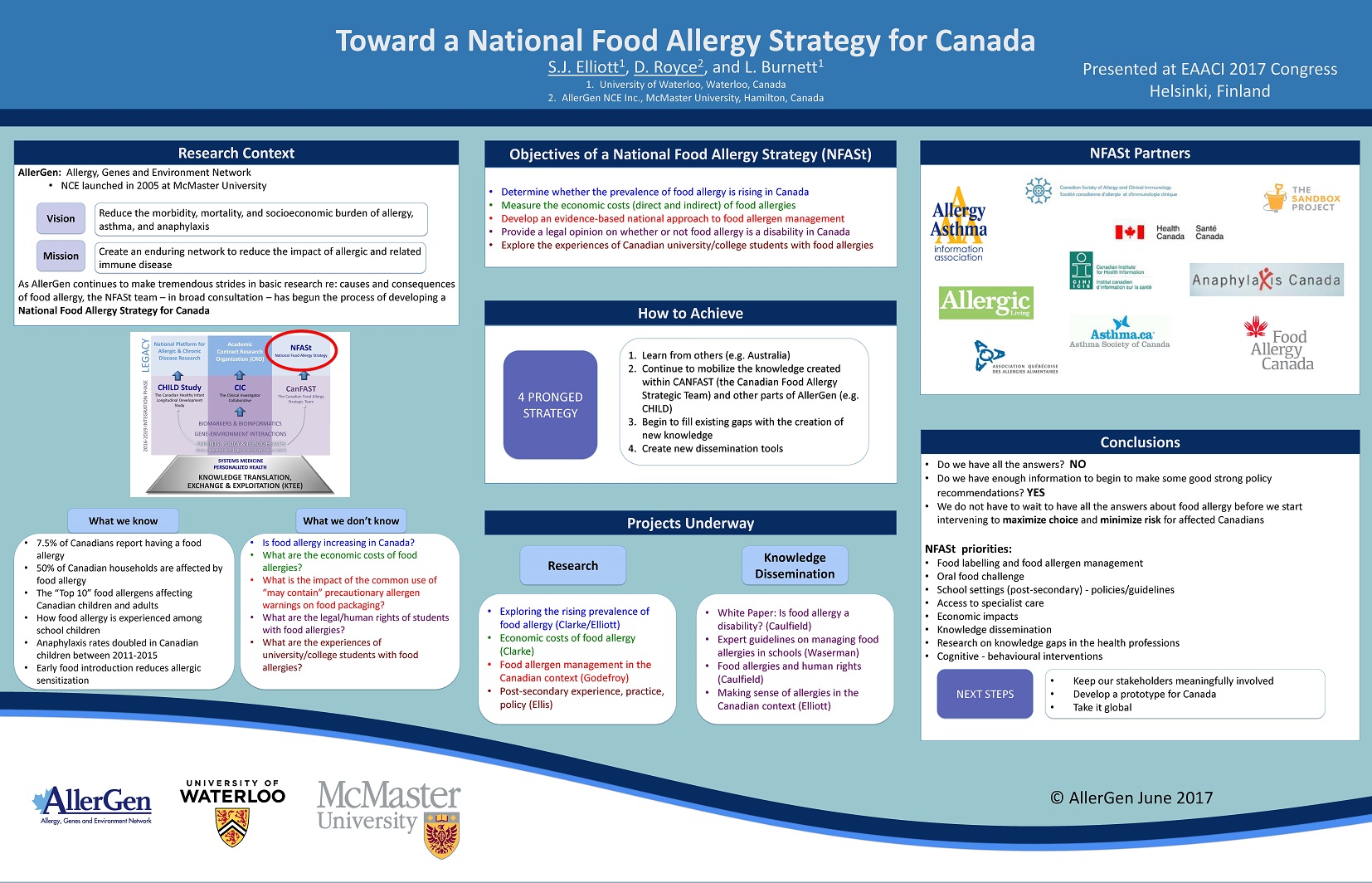AllerGen’s CanFAST Legacy Project is developing, jointly with various partners across sectors and other knowledge users, a National Food Allergy Strategy (NFASt) for Canada: a Knowledge Mobilization platform that will position Canada as a global leader in improving the management of food allergy across environments and settings.
The NFASt will serve as a repository for AllerGen food allergy data and policy- and patient-relevant research results, “bundling” and disseminating the best evidence on diagnosis, treatment, and management of food allergy and anaphylaxis in order to facilitate public engagement, debate and dialogue, and to promote policy, educational programming and practices that maximize choice and minimize risk for individuals affected by food allergies.
A National Food Allergy Coalition
Toward NFASt: Poster (EAACI 2017 Congress)
A National Food Allergy Coalition
The formation of a national food allergy coalition with AllerGen and industry co-leadership has been initiated via a national stakeholder consultation process; the first gathering in this process was held on June 23, 2015. The presentations given at that event are available below.
The coalition will integrate pan-Canadian patient organizations, including Health Canada, the Public Health Agency of Canada, Anaphylaxis Canada, Association Québécoises des Allergies Alimentaires (AQAA), Dietitians of Canada, Allergy/Asthma Information Association (AAIA), and the Sandbox Project, as well as representatives of the biopharmaceutical, food manufacturing and food services industries.
NFASt Goals
The NFASt will:
- Position Canada as a global leader in new approaches to the prevention and management of food allergies
- Inform Canadians about new global guidelines and best practices (e.g., regarding when to introduce allergenic food to children at risk of developing allergies)
The NFASt will create:
- Widespread awareness of—and capacity to avoid—allergic triggers
- Improved access to epinephrine auto-injectors in public spaces (similar to current widespread access to cardiac defibrillators)
- Improved knowledge of how to use epinephrine auto-injectors (similar to existing knowledge of “mouth-to-mouth” and cardiopulmonary resuscitation)
- Improved diagnosis, treatment and management of food allergy and anaphylaxis in primary-care offices, specialty practices and emergency departments
- Increased public awareness of best practices for food allergy/anaphylaxis prevention
- Advanced food labelling reform offering clear, understandable messaging for precautionary “may contain” allergen statements
- Evidence-informed public dialogue, policies and practices about food allergy
Toward NFASt: Poster (EAACI 2017 Congress)
On July 11, 2017, NFASt co-leader Dr. Susan Elliott presented the poster “Toward a National Food Allergy Strategy for Canada” at the European Academy of Allergy and Clinical Immunology (EAACI) 2017 Congress in Helsinki, Finland.
Click on the image to view the poster.
Click here for a transcript of the poster presentation by Dr. Elliott.
Introductory Presentations
On June 23rd, 2015, over 30 key stakeholders attended a meeting in Toronto to begin a conversation about, and to assess the appetite and capacity for, developing a National Food Allergy Strategy (NFASt) for Canada.
Presentations from that meeting follow below (click on the image to view the document).

